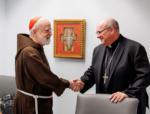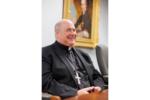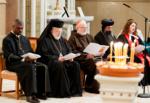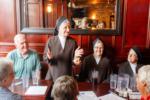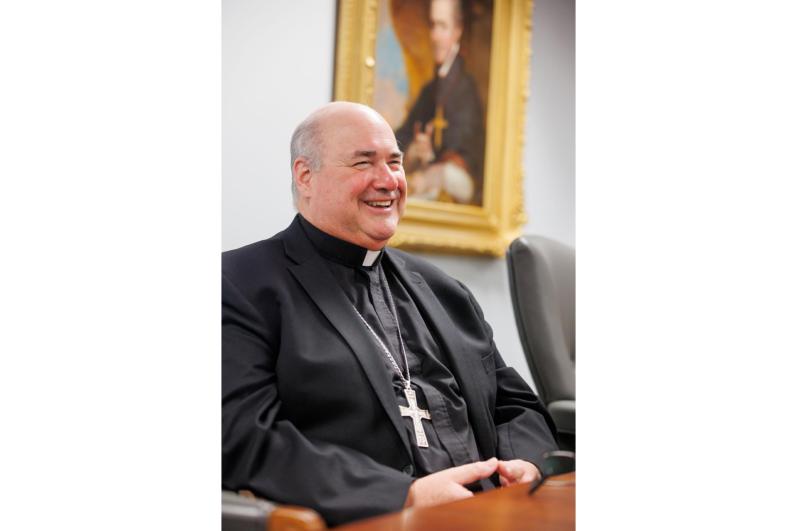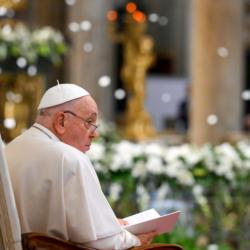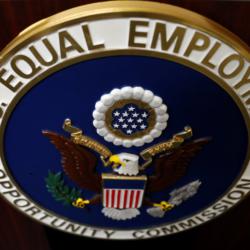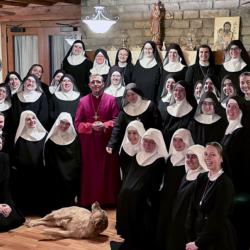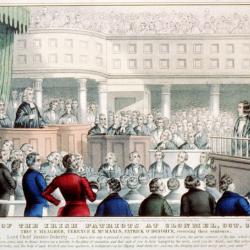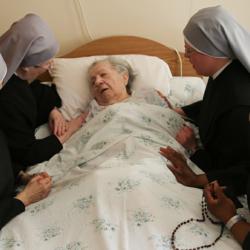Getting to know Archbishop-elect Henning
The Pilot spoke with Archbishop-elect Richard G. Henning at the Pastoral Center in Braintree on Aug. 5, immediately after the press conference announcing his appointment as the next Archbishop of Boston. Following are excerpts from the interview.
Q. Can you tell Pilot readers about your upbringing and your call to the priesthood?
A. We are a family of five. My father is a firefighter, and my mother is a baby nurse and a homemaker. I wouldn't say our family was super religious, but we practiced the faith regularly. I went to Catholic Schools. We knew our parish priest. I worked at the parish. I guess mine was a very conventional, ordinary Catholic upbringing.
My vocation story begins in the fifth grade when a Vincentian priest gave a talk to our Catholic school students. At the time, a bunch of the boys in the class said, "Oh! I would think about that." I was the only one who kept going! I did not do anything about it. I didn't go to a high school seminary or to a seminary college. I went to a Catholic high school and St. John University. It was at the end of high school that I started to get serious and talk to the vocations director, and at the end of college, I entered the seminary.
My sense of call was first and foremost influenced by my parents. I grew up in a household not only where faith mattered but where the meaning of life was found in what you did for others. So, that was very powerful for me, a sort of unspoken formation or lesson that I received. The priests, though, in the parish, too, were a key part of that. So, working in the parish, I was around them a lot. Then, I went to a religious order high school, Chaminade, with Marianist brothers and priests, so they gave me a very solid formation in catechesis, the Scriptures, and the prayer life of the church. So that was a major influence as well.
When I was ordained, I did five years at St. Peter's in Port Washington as a parish priest. That is really where I learned Spanish. The two things I worked on the most were the parish school, which had over 600 children at the time, and the Spanish ministry.
Q. In that context, what would you tell a young person considering a vocation to the priesthood or to religious life?
A. For me, certainly, as you live longer, there are many more challenges. However, I would still go back and make the same choice. A vocation is not like a career. I can't tell you, "You should pick this career because it has good benefits" or something. Ultimately, a vocation is a calling from God. The key is to get the young person to listen to that call because any other reason to come into the priesthood is not going to work; it's going to fail. So, we want them to really discern that God really is calling them. Sometimes, that comes from other people recognizing it in them, so I do say things like that to young people. As I get to know them, I'll say, "You might want to be thinking about that." For me, it's a matter of saying that, while I have had many challenges in my priesthood and life as a bishop, I kind of find my purpose and my meaning and the sense that this really is where God wants me. I don't always agree with where God wants me. I'd be back at the parish if it were up to me, but you give yourself over to God. It is really the mystery of the Christ event, right? You give yourself away and, suddenly, you receive back so much more.
Q. How would you describe your leadership style?
A. I guess you would have to ask the people who have worked with me. I would say, ultimately, as bishop or archbishop, you have to take responsibility for the decisions. I am prepared to do that, but I always prefer that the journey to that decision be cooperative. I have benefitted, when exercising leadership, from being with other partners in that process. Sometimes, that's clergy, sometimes that's parish or diocesan staff, sometimes that's the lay faithful or religious, but I find I'm better when I take the time to listen. That can actually be more work. Sometimes, it is just easier to come to a decision, but I find that, ultimately, it is always richer when you take the time to listen and draw in others. The other truth is that the more people you draw into that partnership, that mission, you really are doing the work of the church that way, too. So, I would say my style is fairly communal.
Q. We live in a very divided society where Christian values are fading from the public square. How do you see the role of the church in re-proposing those basic Christian values to our culture and society at large?
I don't really know the people of Boston well enough yet to say how that would work, but my instinct is to say that the most important thing I can do is enliven the faith of the faithful in society. So it is not my job to be the leaven in society; it's my job to strengthen the leaven for society. There is no way an archbishop, as much as you get attention from the press, can change hearts and minds across 5 million people in this archdiocese. If hearts and minds are going to be changed, they will be changed by the daily witness of faith by the faithful. It is a partnership effort, and so in Providence, my goal has been simply to reaffirm and strengthen people in the faith.
Q. Would abortion be an example of an issue where the church would like to change those hearts and minds?
A. I have to be realistic, and this is an issue I face in Rhode Island, so I guess it should be similar. There was no way I was going to convince the Rhode Island legislature to step away from its fairly radical abortion laws. What I've done for the last year-and-a-half is to argue for more compassion. There are different strategic arguments here. My thinking is that we should be focused on every single life, and any life we save is a life saved. So, I would rather not be kind of gnostic and spend my days thundering against inequity and getting nothing done. I would rather convince people to find some room in their hearts to, for example, allow the pregnancy centers to do what they do for the sake of the women who want to have children. So, the language I used with the politicians in Rhode Island is: Isn't there room in our hearts? Can't we find a way? Isn't there some way to make it more possible for women to have their children and know they are supported in that? And that is a lot of what we do in Providence. We do not just help women while they are pregnant. We help them after they give birth. We provide assistance even then. Because I think the culture wanted to direct them to only one choice, and as I know, and as you know, it is the wrong choice. How do we get the culture to recognize the significance and the value of the sanctity of human life? I don't know that I can do that politically. I think it has to be more exhortational.
Q. The recent influx of newly arrived immigrants challenges the church in Boston to welcome them, but some Catholics are concerned about the influx of immigrants.
Our social engagement is not really, ultimately, about policy. We don't make policy for the state of Massachusetts or the city of Boston. We have a desire to help persons in whatever circumstances they find themselves. The work that we do is not necessarily a commentary on this or that politician or political stance. We have a Catholic Conference in Massachusetts, which does weigh in on the specifics of policy, but I think the ministries should be focused on the dignity of the human person. If you can't see the dignity of the human person, even one different from yourself, then we have a conversion problem that we have to address. So, it's possible for a person to disagree in goodwill on matters of immigration policy.
Q. Boston was at the epicenter of the sexual abuse crisis in 2002. Do you have a message for survivors of clergy abuse?
A. This is an important one. I know it is popular to call Boston an epicenter, but I think the honest truth is that we've discovered across the United States, and across the world, that Boston was the revealer. There may have been individuals here who were particularly egregious, but the sins and crimes that occurred were occurring in lots and lots of places.
I think the stance of the church has to be one of openness, listening, compassion, and love. My message is that I want to receive your witness of faith, I want to know you, I want to hear you, I want to love you.
I would like to continue Cardinal Seán's legacy on this issue. Is there anyone else around who's been more effective in this? I will do my best to learn from him, which means I'm eager to know them.
Q. Final question: Are you a Yankees fan?
This is the New England question I was dreading! I grew up a Mets fan. I am not a Red Sox fan. My sister Maureen has told me I will never be welcome in her home again if I become a Red Sox fan. But here is the deal: if you win the World Series, I'll convert.


